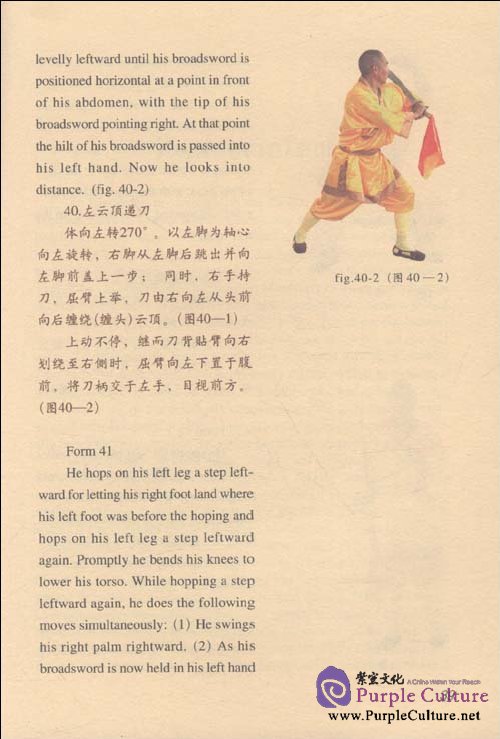Sample Pages Preview


Form 34
Having rested his left foot on its tiptoes on the ground beside his right
foot,
he bends his knees to lower his torso, spreads his right arm levelly
right and his left arm levelly left, with the edge of his broadsword,
which is held in his right hand, facing right and with his broadsword' s
tip pointing forward. Now he looks into distance. (fig. 34-1)
His
left toes slides backward on the ground until they can no longer be kept
in touch with the surface of the ground. Then he puts his left foot a
step forward on the ground, brings his torso forward and slightly
leftward, and lets his right toes scrape backward on the ground before
he lifts his right foot backward off the ground, with his right sole
being turned upward. While his right toes are scraping backward on the
ground, he clings his left hand to his right wrist and swings his right
forearm rightward for moving his broadsword, which is herd in his right
hand, successively upward, leftward, and backward without fully
extending his right arm until his broad- sword comes to a point off the
right side of his right thigh.
PrefaceThe culture of
such traditional Chinese martial arts as are peculiar to in Shaolin
Buddhist Monastery is both uniquely expansive and subtly philosophic and
stands out as a component of world cultural heritage.
Though there
is an astoundingly bountiful spectrum, offered over centuries by the
monastery, of pugilistic routines and traditional weaponry routines, yet
none of them has ever been handed down to the monastic posterity in an
unsystematic manner. Nevertheless we are confronted with the problem of
technical adulteration that spoils the authenticity of some of Shaolin
martial-art forms or routines. The problem is playing havoc with
martial-art competitions as well as training programs across our
country. Admittedly some martial-art coaches' mishandlings of Shaolin
kung-fu lore have contributed partially to the problem. Therefore
Shaolin Monastery takes it for granted that it is incumbent upon the
monastery to retrieve such portions of Shaolin kung-fu lore as have
already sunk into oblivion, to re- systematize Shaolin kung-fu lore and
the systems of pugilistic and weaponry routines, and to standardize all
of them. The first step the monastery took in this connection was the
initiation of a hunt for the lost portions of Shaolin kung-fu lore by
approaching not only the Buddhist martial artists but also such secular
martial artists as have received kung-fu training at the monastery
precisely for soliciting information that.

